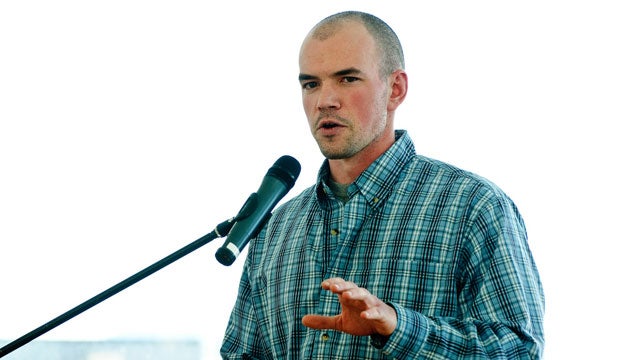Yesterday, on Earth Day, the climate activist Tim DeChristopher, who was incarcerated for 21 months for disrupting a federal oil and gas lease auction, was released from the federal prison system. He’d been in a halfway house in Salt Lake City since October; before that, his homes were prisons in Littleton, Colorado, and Herlong, California, where he was briefly held in isolation for, he claims, writing a letter threatening to return funds to a donor whom he suspected of outsourcing American jobs.
The Trials of Bidder 70
Tim DeChristopher’s story.DeChristopher celebrated his freedom by returning to the public eye, first in a televised with Democracy Now’s Amy Goodman, and then in an appearance at a Salt Lake City theater that was showing a documentary about him, , by the Colorado filmmakers Beth and George Gage. (The film was simultaneously screened in 55 other theaters around the country.) DeChristopher’s head was freshly shaved and he looked fit, less bulky than in the months leading up to his incarceration, when I reported on his case for ���ϳԹ���. His energy seemed less , but prison had not cowed him. He told Goodman his whole ordeal was “a great learning experience,” and continued, “I think we need to take more of those risks.”
At the Salt Lake screening, which was streamed over the Web, he was surrounded by a hometown crowd of about 300, including many members of the Salt Lake City nonprofit he cofounded, Peaceful Uprising, who wore their trademark orange scarves. Watching over my computer screen, I also recognized the vibe in the room: the feeling of collective effervescence that surrounded DeChristopher in the time I spent with him leading up to his incarceration. One commenter, a man who looked to be in his sixties, said, “Mr. DeChristopher, I am humbled to stand before you.” Audience members asked DeChristopher about prison, about capitalism’s role in climate change, about the future of the environmental movement. DeChristopher gamely tackled all the queries, some of which were extremely broad.
- On why America is slower to adopt alternative energy than other countries: “We have more rich people. We have richer companies and more money in politics than other countries.”
- On the criminal justice system: “What I found was that the level of injustice in my case was not unusual … When I explained everything with my case to other people in prison they were like, ‘Yeah. I know.’”
- On federal district Judge Dee Benson, who sentenced DeChristopher: “I would love to challenge Dee Benson to a public debate about the role of the jury in our legal system.”
- On Occupy: “The biggest social movement in my lifetime happened and I missed it.”
- On climate change: “It’s too late to solve it. The question is what’s going to get us through.”
The wry disaffection and humor sounded familiar, and I was glad to hear it again. DeChristopher often seems like he’s privy to a great inside joke that no one else has figured out yet. He’s both infuriated and bemused. But there was something else, too, yesterday: optimism. DeChristopher said, “I feel more confident about the climate movement now than I have in a long time.” The next step, he said, was for activists to “stop waiting for people like me to tell them what the next step is … What we need is a movement that’s a little bit out of control.” He seemed to think this was happening, referring to both the Occupy movement and the ongoing battle over the Keystone XL pipeline, which, he said, did something new: connect “the politics to the grassroots activist.”
He said he plans to continue his activism, but not as his sole pursuit. This may be out of necessity: he’s on probation for the next three years. In the fall DeChristopher is enrolling at Harvard Divinity School, where, he said, he hopes to help “figure out a concept we have a word for but rarely discuss. It’s a word called enough.”
First, though, he’s going on a well-earned vacation. “I’m going to take a river trip down Cataract Canyon,” he said, “because I’ve been a little cooped up for awhile.”


